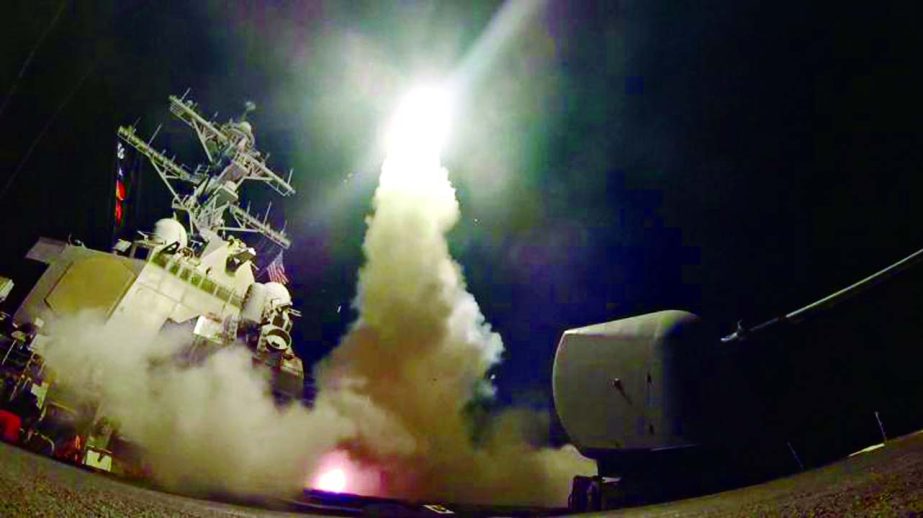
Reuters, Palm Beach, Fla./Moscow/Beirut
The United States fired cruise missiles on Friday at a Syrian airbase from which President Donald Trump said a deadly chemical weapons attack had been launched, the first direct U.S. assault on the government of Bashar al-Assad in six years of civil war.
In the biggest foreign policy decision of his presidency so far, Trump ordered the step his predecessor Barack Obama never took: directly targeting Assad’s military as punishment for the chemical weapons attack which killed at least 70 people. That catapulted the United States into a confrontation with Russia, which has military advisers on the ground assisting its close ally Assad.
“Years of previous attempts at changing Assad’s behavior have all failed and failed very dramatically,” Trump said as he announced the attack from his Florida resort, Mar-a-Lago, where he was meeting Chinese President Xi Jinping.
“Even beautiful babies were cruelly murdered in this very barbaric attack,” he said of Tuesday’s chemical weapons strike, which Western countries blame on Assad’s forces. “No child of God should ever suffer such horror.”
The swift action is likely to be interpreted not only as a signal to Russia, but also to other countries such as North Korea, China and Iran where Trump has faced foreign policy tests early in his presidency.
The Syrian army said the U.S. attack killed six people at its air base near the city of Homs. It called the attack “blatant aggression” and said it made the United States a “partner” of “terrorist groups” including Islamic State. Homs Governor Talal Barazi told Reuters the death toll
was seven. A spokesman for Russian President Vladimir Putin said the strike had seriously damaged ties between Washington and Moscow. Putin regarded the U.S. action as “aggression against a sovereign nation” on a “made-up pretext”, spokesman Dmitry Peskov said.
Russian television showed craters and rubble at the site of the airbase and said nine aircraft had been destroyed.
U.S. officials said they had taken pains to ensure Russian troops were not killed, warning Russian forces in advance and avoiding striking parts of the base where Russians were present. Western allies of the United States spoke out in support of the decision to launch the strikes. Several countries said they were notified in advance, but none had been asked to take part. Iran, Assad’s other main ally, denounced it.
U.S. officials described the attack as a one-off that would not lead to wider escalation, and Syrian officials and their allies also said they did not expect the attack to lead to an expansion of the conflict.
“No doubt this will leave great tension on the political level, but I do not expect a military escalation. Currently I do not believe that we are going toward a big war in the region,” a senior, non-Syrian official in the alliance fighting in support of Assad who declined to be identified told Reuters.
For years, Washington has backed rebel groups fighting against Assad in a complex multi-sided civil war under way since 2011 that has killed more than 400,000 people. The war has driven half of Syrians from their homes, creating the world’s worst refugee crisis.
The United States has been conducting air strikes against Islamic State militants who control territory in eastern and northern Syria, and a small number of U.S. troops are on the ground assisting anti-Islamic State militias. But until now, Washington has avoided direct confrontation with Assad.
Russia, meanwhile, joined the war on Assad’s behalf in 2015, action that decisively turned the momentum of the conflict in the Syrian government’s favor.
Trump’s decision to strike Syrian government forces is a particularly notable shift for a leader who in the past had repeatedly said he wanted better relations with Moscow, including to cooperate with Russia to fight Islamic State. However, Trump had also criticized Obama for setting a “red line” threatening force against Assad if he used chemical weapons, only to pull back from ordering air strikes in 2013 when Assad agreed to give up his chemical arsenal. Russian media long portrayed Trump as a figure who would promote closer relations with Moscow. At home, Trump’s opponents have accused him of being too supportive of Putin.
On Friday, a warplane hit the town of Khan Sheikhoun where Tuesday’s chemical attack took place. An activist working at an air raid warning service in opposition areas told Reuters it caused only material damage.
Tuesday’s attack was the first time since 2013 that Syria has been accused of using sarin, a banned nerve agent it was meant to give up under the Russian-brokered, U.N.-enforced deal that persuaded Obama to call off air strikes four years ago.
The Syrian government and Moscow have denied that Syrian forces were behind the attack, but Western countries have dismissed their explanation – that chemicals leaked from a rebel weapons depot after an air strike – as beyond credibility. Video and pictures of the aftermath of Tuesday’s chemical attack were shown around the world this week, depicting limp bodies and children choking while rescue workers hosed them down to try to wash off the poison gas.
In Russia, state television blamed rebels and did not show footage of victims. Tomahawk missiles were fired from the USS Porter and USS Ross around 0040 GMT, striking multiple targets – including the airstrip, aircraft and fuel stations – on the Shayrat Air Base, which the Pentagon says was used to store chemical weapons. U.S. Secretary of State Rex Tillerson said the strike did not mean the wider U.S. policy on Syria had changed.

